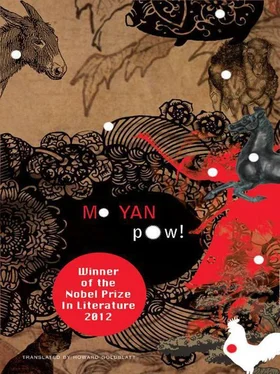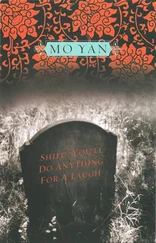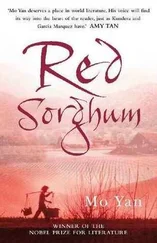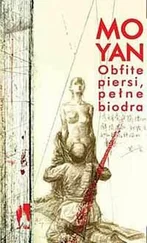Seven or eight cattle merchants were sitting on their haunches at the edge of the threshing ground, smoking cigarettes as they waited for the butchers to show up. Their cattle stood off to the side, absent-mindedly chewing their cud, oblivious to their impending doom. The merchants, most of them from West County, spoke with funny accents, like actors on the radio. They showed up every ten days or so, each bringing two heads of cattle, maybe three. For the most part, they came on a slow, mixed freight-and-passenger train, man and beast in one car, arriving around sunset. They didn't reach our village till after midnight, even though the little station where they got off was no more than ten li away. A stroll that should have taken no more than a couple of hours took these merchants and their cattle a good eight. First, the cattle, made dizzy by the swaying of the train, had to be forced up to the exit, where the ticket-collectors, in blue uniforms and billed caps, checked to see that every passenger had a ticket, animals included, before being allowed to get on the road. Passing through the turnstile was the signal for the cows to leave a foul, watery mess on the ground and on the ticket-collectors’ trouser legs, as if teasing or mocking them, perhaps getting even. In the spring came the chicken and duck merchants, also from West County, carrying their loads in baskets woven out of bamboo or reed strips, balanced on each end of a wide, sleek, springy shoulder pole that weighed them down as they left the station and then flew down the road, leaving the cattle merchants in their dust. They wore wide straw hats and draped blue capes over their shoulders as they sprinted along, an impressively carefree sight in contrast to the sloppy, manure-covered and dejected cattle merchants who shaved their heads, left their shirts unbuttoned and wore faddish mirrored sunglasses. Their feet splayed in a V as they headed into the red setting sun, rocking from side to side, like sailors when they step ashore, walking to our village on the dirt road. When they reached the historic Grand Canal, they led their cattle up to the water to let them drink their fill. Weather permitting—that is, if it wasn't unbearably cold—they washed their cattle, thus improving the animals’ spirits as well as their appearances until they gleamed like new brides. Once the cows were clean, it was the merchants’ turn and they lay on the fine sand of the riverbank and let the cold water wash over them. If young women happened to pass by, the men would howl like dogs baying at females in heat. Then, once they'd spent enough time horsing round, they'd climb up onto the bank and turn the cattle loose to feed on night grass while they sat in a circle to fill their stomachs with meat and baked flat bread, washing it all down with liquor. They'd carry on until the stars lit up the sky; then they'd retrieve the animals and stumble drunkenly down the road to our village. Why did they prefer to reach our village in the middle of the night? That was their secret. When I was young, I asked my parents and some of the village greybeards that very question. But they just gave me stony looks, as if I'd asked them the meaning of life or a question whose answer everyone knew. Leading the cattle into the village was a signal for the village dogs to set up a chorus of barks, which woke up everyone—man, woman, young and old—and informed them that the cattle merchants had arrived. In my youthful memories, they were a mysterious lot, and this sense of mystery was surely heightened by their late-night arrival in our village. I couldn't stop thinking that there had to be some profound significance to their timing but the grown-ups apparently never thought so. I recall how, on some moonlit nights, when the silence was broken by a chorus of dog barks, Mother would sit up, wrapped in the comforter, stick her face close to the window and gaze at the scene out on the street. That was before Father left us but already there were nights when he didn't come home. Without a sound, I'd sit up too and look past Mother out the window, watching the cattle merchants drive the animals ahead of them, slipping silently past our house, the newly bathed cattle glinting in the moonlight like giant pieces of glazed pottery. If not for the chorus of dog barks, I'd have thought I was observing a beautiful dreamscape. Even their barking couldn't take away all the mystery of that sight. Our village boasted several inns but the merchants never bedded down in any of them; instead, they led their cattle straight to the threshing floor and waited there till dawn, even if a wind was howling or it was raining, even if the air was bitter cold or steamy hot. There were stormy nights when innkeepers went out to drum up business, but the merchants and their cattle remained in the inhospitable elements like stone statues, unmoved, no matter how flowery the invitation. Was it because they didn't want to part with that little bit of money? No. People said that, after they sold their cattle, they went into town to get drunk and whore round, on a spending spree that stopped only when they had barely enough to buy a ticket for the slow train home. Their lifestyle could not have been more different from that of the peasants, with which we were so familiar. Their thinking too. As a youngster, on more than one occasion, I heard some of our more eminent villagers sigh: ‘Hai, what kind of people are they? What in the world is going on in those heads?’ That's right, what in the world could they be thinking? When they came to market they brought brown cows and black ones, males and females, fully grown cows and young calves; once they even brought a nursing heifer whose teats looked like water jugs. Father had trouble estimating a price for her since he didn't know if the udder was edible.
The cattle merchants scrambled to their feet when they saw my father. They'd be wearing mirrored sunglasses even early in the morning, an eerie sight, though they smiled as a show of respect. He'd take me down off his shoulders, get down on his haunches ten feet or so from the merchants, take out a crumpled pack from which he'd remove a crooked, damp cigarette. The cattle merchants would take out their packets, and ten or more cigarettes would land on the ground by Father's feet. He'd gather them up and lay them back down neatly. ‘Lao Luo, you old fuckhead,’ one of the merchants would say, ‘smoke ’em. You don't think we're trying to buy your favours with a few paltry cigarettes, do you?’ Father would just smile and light his cheap smoke as the village butchers started showing up, in twos and threes, looking like they were fresh from a bath, though I could smell the scent of blood on their bodies (which goes to prove that blood—whether from cows or pigs—never washes off). The cattle, smelling the blood on the butchers, would huddle together, their eyes flashing with fear. Excrement would spurt from the bungholes of the young cows; the older ones looked composed, though I knew they were pretending—I could see the tails draw up under their rumps to keep from emptying their bowels and the tremble in their legs, like the ripples on a pond from a passing breeze. Peasants care deeply for their cows; to kill one, especially one advanced in years, has long been considered a crime against nature. A leprous woman in our village often ran over to the head of the village and wailed at the graveyard in the late-night stillness. Only one phrase, over and over: ‘Who among our ancestors killed a cow and left his sons and grandsons to suffer for it?’ Cows cry. Before that old milk cow that so troubled my father was slaughtered, it fell to its knees in front of the butcher and a torrent of tears spilt from its watery blue eyes. The hand holding the knife trembled as tales about cows flooded the butcher's mind. The knife slipped from his hand and clattered to the ground. Weak at the knees, he knelt in front of the cow, loud wails bursting from his lungs. That was the end of his butcher days; he became a specialist in raising dogs instead. When he was asked why he'd knelt in front of the cow and wailed, he'd answered: ‘I saw my dead mother in its eyes, and I thought it was her reincarnated soul.’ This one-time butcher's name was Huang Biao; and after he began raising dogs, he tended that cow the way a son would care for his ageing mother. When the fields were lush with edible grass, we'd see him leading the old cow over to the edge of the river to graze. Huang Biao walked along, followed by the cow, no tether needed. People heard him say: ‘Let's go down to the river, Mother, where there's lots of nice, fresh grass.’ And people heard him say: ‘Let's go home, Mother, it's getting dark. You don't see too well and I don't want you to eat anything poisonous.’ Huang Biao was a man of vision. People laughed when he began raising dogs. But after only a few years there were no more laughs. He bred local dogs with German wolfhounds who produced litters that were both fearless and smart, fine animals that made wonderful watchdogs, excellent at alerting their masters to trouble. They could smell from half a mile away the officials and journalists on their way to the village, coming to investigate trafficking in illegal meat. They'd bark up a din, warning the butchers in time to clean up the area and hide the incriminating evidence. A couple of newspaper reporters once came to the village posing as meat merchants, hoping to expose the illegal meat trade for which the place had become notorious. They went so far as to smear pig and cow blood on their coats to get past the butchers’ sharp eyes, but they could not fool the noses of Huang Biao's mixed-breed dogs, a dozen of which chased them from one end of the village to the other, nipping and biting at their heels until the men's IDs fell out of the crotches of their pants. The complicity of corrupt local officials was just the beginning—Huang Biao also played a major role in keeping the inspectors from finding evidence of illegal meat production in the village. He also bred food dogs, stupid animals that wagged their tails for anyone—owner or thief, it made no difference. With their simple minds and gentle dispositions, the food dogs spent most of their time eating and sleeping, which put plenty of meat on their bones. The supply of those dogs always fell short of the demand—customers lined up to buy them as soon as they were born. Blossom Hamlet, about five or six li from our village, was home to families of Korean descent for whom dog meat was the number-one delicacy. This meant they were skilled dog-meat chefs who opened restaurants in the county seat, in the big cities, even in the provincial capital. Blossom Hamlet dog meat gained its fame thanks mainly to the supply of animals from Huang Biao. His meat smelt like dog when it was cooked but gave off a beefy aroma. Why? Because he weaned the pups days after they were born in order to speed up the bitches’ reproductive cycle and fed them milk that came, unsurprisingly, from his old cow. When they saw how rich the sale of dogs made Huang Biao, some mean-spirited people in the village attacked him cruelly: ‘Huang Biao, you think you're a dutiful son by treating an old milk cow like your mother, but you're really a shameless hypocrite. If that old cow is your mother, then you shouldn't squeeze her teats to feed a bunch of puppies. If you do, you've turned your mother into a bitch. And if she's a bitch, then you're a son of a bitch. And if you're a son of a bitch, that makes you a dog, doesn't it?’ Incensed by this hounding, he showed the whites of his eyes. Instead of trying to figure out why they kept taunting him, he picked up his trusty butcher's knife and went after them and the murder in his eyes made them run for their lives. But one day Huang Biao's lovely new wife set the dogs loose, the stupid ones following the smarter mongrels, on her husband's tormentors, and in a matter of moments human shrieks and canine growls filled the village's twisting streets and byways. As she laughed gloriously, her skin as white as ivory, he stood there with a silly smile, scratching the coal-black skin of his neck. Before taking a wife, Huang Biao had been a frequent visitor to a spot beneath Wild Mule's window, where he sang to her in the middle of the night. ‘Go home, little brother,’ she'd say to him. ‘I've got my man. But don't worry, I'll find you a wife.’ And she did—a girl who worked in a roadside shop.
Читать дальше












